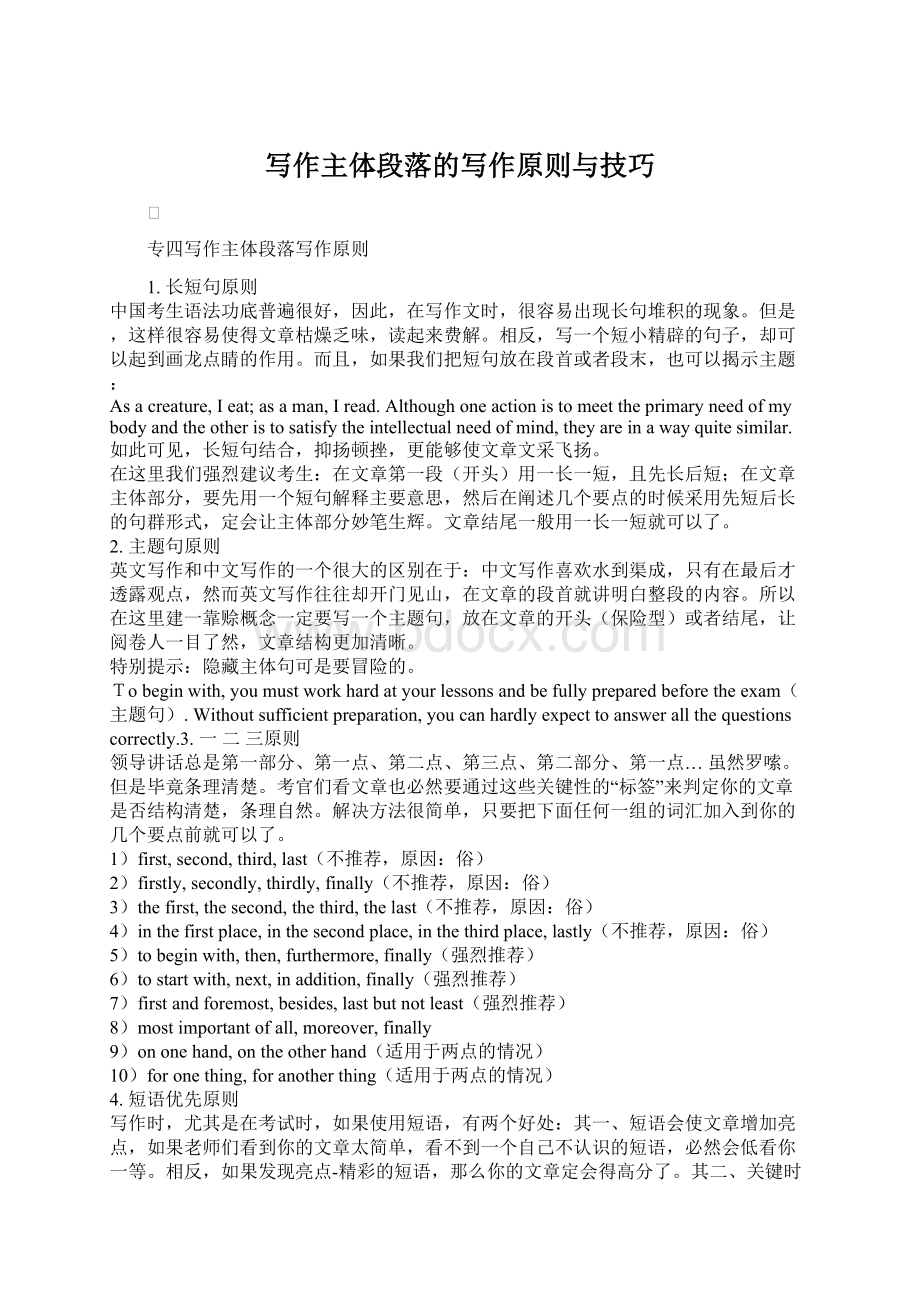写作主体段落的写作原则与技巧Word文档格式.docx
《写作主体段落的写作原则与技巧Word文档格式.docx》由会员分享,可在线阅读,更多相关《写作主体段落的写作原则与技巧Word文档格式.docx(15页珍藏版)》请在冰豆网上搜索。

领导讲话总是第一部分、第一点、第二点、第三点、第二部分、第一点…虽然罗嗦。
但是毕竟条理清楚。
考官们看文章也必然要通过这些关键性的“标签”来判定你的文章是否结构清楚,条理自然。
解决方法很简单,只要把下面任何一组的词汇加入到你的几个要点前就可以了。
1)first,second,third,last(不推荐,原因:
俗)
2)firstly,secondly,thirdly,finally(不推荐,原因:
3)thefirst,thesecond,thethird,thelast(不推荐,原因:
4)inthefirstplace,inthesecondplace,inthethirdplace,lastly(不推荐,原因:
5)tobeginwith,then,furthermore,finally(强烈推荐)
6)tostartwith,next,inaddition,finally(强烈推荐)
7)firstandforemost,besides,lastbutnotleast(强烈推荐)
8)mostimportantofall,moreover,finally
9)ononehand,ontheotherhand(适用于两点的情况)
10)foronething,foranotherthing(适用于两点的情况)
4.短语优先原则
写作时,尤其是在考试时,如果使用短语,有两个好处:
其一、短语会使文章增加亮点,如果老师们看到你的文章太简单,看不到一个自己不认识的短语,必然会低看你一等。
相反,如果发现亮点-精彩的短语,那么你的文章定会得高分了。
其二、关键时刻思维短路,只有凑字数,怎么办?
用短语是一个办法。
比如:
Icannotbearit.
可以用短语表达:
Icannotputupwithit.
Iwantit.
Iamlookingforwardtoit.
这样字数明显增加,表达也更准确。
5.多实少虚原则
原因很简单,写文章还是应该写一些实际的东西,不要空话连篇。
这就要求一定要多用实词,少用虚词。
我这里所说的虚词就是指那些比较大的词。
比如我们说一个人很好的时候,不应该直说nice这样空洞的词,应该使用一些诸如generous,humorous,interesting,smart,gentle,warm-hearted,hospital之类的形容词。
再比如:
走出房间,general的词是:
walkoutoftheroom,但是小偷走出房间应该说:
slipoutoftheroom
小姐走出房间应该说:
sailoutoftheroom,小孩走出房间应该说:
danceoutoftheroom,老人走出房间应该说:
staggeroutoftheroom,所以多用实词,少用虚词,文章将会大放异彩。
6.多变句式原则
(1)加法(串联)
都希望写下很长的句子,像个老外似的,可就是怕写错,怎么办,最保险的写长句的方法就是这些,可以在任何句子之间加and,但最好是前后的句子又先后关系或者并列关系。
比如说:
Ienjoymusicandheisfondofplayingguitar.
如果是二者并列的,我们可以用一个超级句式:
Notonlythefurcoatissoft,butitisalsowarm.
其它的短语可以用:
besides,furthermore,likewise,moreover
(2)转折(拐弯抹角)
批评某人缺点的时候,我们总习惯先拐弯抹角说说他的优点,然后转入正题,再说缺点,这种方式还比较容易让人接受。
所以呢,我们说话的时候,只要在要点之前先来点废话,注意二者之间用个专这次就够了。
Thecarwasquiteold,yetitwasinexcellentcondition.thecoatwasthin,butitwaswarm.
更多的短语:
despitethat,still,however,nevertheless,inspiteof,despite,notwithstanding
(3)因果(so,so,so)\
昨天在街上我看到了一个女孩,然后我主动搭讪,然后我们去咖啡厅,然后我们认识了,然后我们成为了朋友…可见,讲故事的时候我们总要追求先后顺序,先什么,后什么,所以然后这个词就变得很常见了。
其实这个词表示的是先后或因果关系。
Thesnowbegantofall,sowewenthome.
更多短语:
then,therefore,consequently,accordingly,hence,asaresult,forthisreason,sothat
(4)失衡句(头重脚轻,或者头轻脚重)
有些人脑袋大,身体小,或者有些人脑袋小,身体大,虽然我们不希望长成这个样子,可如果真的是这样了,也就必然会吸引别人的注意力。
文章中如果出现这样的句子,就更会让考官看到你的句子与众不同。
其实就是主语从句,表语从句,宾语从句的变形。
举例:
ThisiswhatIcando.
Whetherhecangowithusornotisnotsure.
同样主语、宾语、表语可以改成如下的复杂成分:
Whentogo,whyhegoesaway…
(5)附加(多此一举)
如果有了老婆,总会遇到这样的情况,当你再讲某个人的时候,她会插一句说,我昨天见过他;
或者说,就是某某某,如果把老婆的话插入到我们的话里面,那就是定语从句和同位语从句或者是插入语。
Themanwhomyoumetyesterdayisafriendofmine.
Idon’tenjoythatbookyouarereading.
MrLiu,ouroralEnglishteacher,iseasy-going.
其实很简单,同位语--要解释的东西删除后不影响整个句子的构成;
定语从句-借用之前的关键词并且用其重新组成一个句子插入其中,但是whomorthat关键词必须要紧跟在先行词之前。
(6)排比(排山倒海句)
文学作品中最吸引人的地方莫过于此,如果非要让你的文章更加精彩的话,那么我希望你引用一个个的排比句,一个个的对偶句,一个个的不定式,一个个的词,一个个的短语,如此表达将会使文章有排山倒海之势。
Whetheryourtastesaremodernortraditional,sophisticatedorsimple,thereisplentyinLondonforyou.
Nowadays,energycanbeobtainedthroughvarioussourcessuchasoil,coal,naturalgas,solarheat,andthewindandoceantides.
Wehavegottostudyhard,toenlargeourscopeofknowledge,torealizeourpotentialsandtopayforourlife.(气势恢宏)
要想写出如此气势恢宏的句子非用排比不可。
英语专四写作开头技巧
1.开头技巧一:
名人名言
开头引用名人不仅能够作为很好的切入点展开话题,而且还能够显示考生深厚的英语功底。
可能有的考生会疑惑:
“我没有记住名言,怎么办?
尤其是英语名言?
”一般来说,引用名人名言不一定要记住每个单词才行。
如果考生能够记住大致的内容,也可以引用。
引用名人名言的经典句型:
Aproverbsays,“youareonlyyoungonce.”(适用于已记住的名言)
Itgoeswithoutsayingthatwecannotbeyoungforever.(适用于只记住大致意思的名言)
更多经典句型:
Aseveryoneknows,noonecandenythat
2.开头技巧二:
数字统计
要想使自己的论证更有说服力,就应该用实际的数字来说明。
原则上在议论文当中十不应该出现虚假数字的,可是在考试考生只需要记住一个大概得数据即可。
所以不妨试用下面的句型:
Accordingtoarecentsurvey,about78.9%ofthecollegestudentswantedtofurthertheirstudyaftertheirgraduation.
更多句型:
Arecentstatisticsshowsthat
除以上两种特殊用法以外,我们为考生整理了以下开头常用句型,供考生参考:
文章开头句型:
1.对立法:
先引出其他人的不同看法,然后提出自己的看法或者偏向于某一看法,
适用于有争议性的主题.
例如
1)Whenaskedabout...,thevast/overwhelmingmajorityofpeople saythat...ButIthink/viewabitdifferently.
2)Whenitcomesto....,somepeoplebelievethat.......Others argue/claimthattheopposite/reverseistrue.Thereisprobablysometruth inbotharguments/statements,but(Itendtotheproffer/latter...)
3)Now,itiscommonly/generally/widelybelieved/held/acknowledged that....Theyclaim/believe/arguethat...ButIwonder/doubtwhether.....
2.现象法引出要剖析的现象或者问题,然后评论.
1)Recentlytheriseinproblemof/(phenomenonof)...hascause/arousedpublic/popular/wide/worldwideconcern.
2)Recentlytheissueoftheproblemof/thephenomenonof...hasbeenbroughtintofocus.(hasbeenbroughttopublicattention)
3)Inflation/Corruption/Socialinequality...isyetanotherofthe newandbittertruthwehavetolearntofacenow/constantly.
3.观点法--开门见山,直截了当地提出自己对要讨论的问题的看法.
1)Neverhistoryhasthechangeof..beenasevidentas...Nowhereintheworld/Chinahastheissue/ideaof..beenmorevisible/popularthan...
2)Nowpeopleingrowing/significantnumbersarebeginning/comingtorealize/accept/(beaware)that...
3)Nowthereisagrowingawareness/recognitionofthenecessityto......Nowpeoplebecomeincreasinglyaware/consciousoftheimportanceof......
4)Perhapsitistimetohaveafreshlookattheattitude/ideathat.......
4.引用法--先引出有代表性的看法,来引出文章要展开论述的观点!
1)"
Knowledgeispower."
suchistheremarkmadebyBacon. Thisremarkhasbeensharedbymoreandmorepeople.
"
Educationisnotcompletewithgraduation."
Suchistheopinionofa greatAmericanphilosopher.Nowmoreandmorepeoplesharehisopinion.
2)"
........."
Howoftenwehearsuchstatements/wordslikethose/this. Inourowndaysweareusedtohearingsuchtraditionalcomplainsasthis"
......"
.
5.比较法--通过对过去,现在两种不同的倾向,观点的比较,引出文章要讨论的观点.
1)Foryears,...hadbeenviewedas...Butpeoplearetakingafreshlooknow.Withthegrowing...,people........
2)Peopleusedtothinkthat...(Inthepast,....)Butpeoplenowsharethisnew.
6.故事法--先讲一个较短的故事来引发读者的兴趣,引出文章的主题.
1)Oncein(anewspaper),Ireadof/learnt....Thephenomenonof...hasarousedpublicconcern.
2)Ihaveafriendwho...Shouldhe....?
Suchadilemmaweare oftenconfrontwithinourdailylife.
3)Onceuponatime,therelivedamanwho...Thisstorymaybe (unbelievable),butitstillhasarealisticsignificancenow.
7.问题法--先用讨论或解答的设问,引出自己观点,适用于有争议性的话题.
Should/What......?
Optionsof...varygreatly,some...,others...Butinmyopinion,...
英语专四写作怎样使句子多样化
最好的方法是以简单句为基础,配合适当的并列句和复杂句。
简单句可长可短,通常要加些附属成分,如分词短语、介词短语、副词短语、不定式动词短语,以及节缩成分。
总之,作者可根据情况,使句子多样化,使文章灵活多姿。
例如下列五个句子的基本概念一样,但是句式不同,内容重点也有些差别:
(1)Thegoatsgrazedpeacefullyinthefarmandwereunawareoftheapproachinghunter.(并列分句
(1)+2)
(2)Grazingpeacefully,thegoatsinthefarmwereunawareoftheapproachinghunter.(现在分语短语+简单句)
(3)Inthefarm,thegoatsgrazedpeacefullyandwereunawareoftheapproachinghunter.(副词短语+并列分句
(1)-
(2))
(4)Thereweregoatsgrazingpeacefullyinthefarm,unawareoftheapproachinghunter.(简单句+形容语短语)
(5)Asthegoatsgrazedpeacefullyinthefarm,theywereunawareoftheapproachinghunter.(原因副词从句+主句)
(6)Theyoungpilotwasonhisfirstoverseastraining.
(7)Hefeltveryuneasy.
(a)Theyoungpilotonhisfirstoverseastrainingfeltveryuneasy.
(b)Theyoungpilotfeltveryuneasyduringhisfirstoverseastraining.
(c)Theyoungpilot'
sfirstoverseastrainingmadehimfeelveryuneasy.
(d)Extremeuneasinessseizedtheyoungpilotonhisfirstoverseastraining.
(e)Theyoungpilotwasonhisfirstoverseastraining,feelingveryuneasy.
(f)Itbeinghisfirstoverseastraining,theyoungpilotfeltveryuneasy.
(g)Beingonhisfirstoverseastraining,theyoungpilotfeltveryuneasy.
(h)Theyoungpilotwasonhisfirstoverseastrainingandfeltveryuneasy.
(i)Theyoungpilot,whowasonhisfirstoverseastraining,feltveryuneasy.
(j)Whentheyoungpilotwasonhis/firstoverseastrainging,hefeltveryuneasy.
(k)Astheyoungpilotwasonhisfirstoverseastraining,hefeltveryuneasy.
(l)Theyoungpilotwasonhisfirstoverseastraining,sothathefeltveryuneasy.
在上述12个句子中,(a)-(g)是简单句;
(h)是并列句;
(i)-(l)是复杂句。
简单句除(b)和(g)之外,其他五样,用的人并不多。
人们最喜欢采用复杂句,尤其是(j)和(k)这两款;
接着便是并列句(h)。
如果大多数人的句子只限于(b),(g),(h),(j)和(k)这五种,而其他的则弃如敝屣,不是很可惜吗?
增强英语语句表现力的有效方法
一、避免使用语意弱的“be”动词。
1、把句中的表语转换为不同的修饰语。
例如:
Weak:
Thetreesarebare.Thegrassisbrown.Thelandscapeseemsdrab.
Revision:
Thebrowngrassandbaretreesformadrablandscape.(转换为前置定语)
Or:
Thelandscape,bareandbrown,beggedforspringgreen.(转换为并列结构作后置定语)
2、将作表语用的形容词或名词变为行为动词。
1)Weak:
Theteammembersaregoodplayers.
Theteammembersplaywell.
2)Weak:
Oneworker’splanistheeliminationoftardiness.
Oneworker’splaneliminatestardiness.
3、在以“here”或“there”开头的句子中,把“be”动词后的名词代词变成改写句的主语。
例如:
Thereisnoopportunityforpromotion.
Noopportunityforpromotionexists.
Herearethebooksyouordered.
Thebooksyouorderedhavearrived.
二、多用语意具